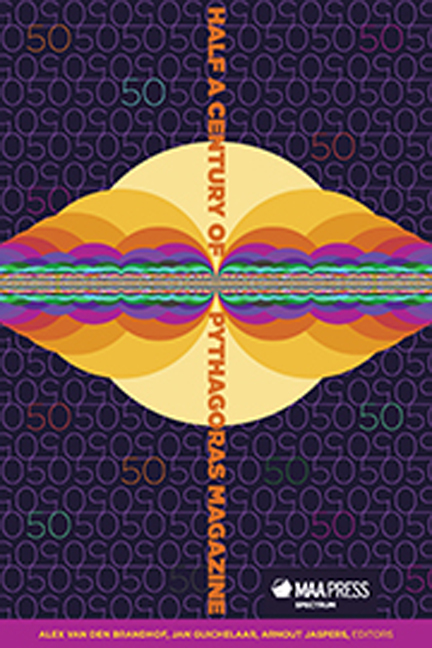Preface
Summary
In 1960, a mathematical journal for high school students was founded in the Netherlands, an idea of the Dutch mathematician Hans Freudenthal. Its name: Pythagoras. The first two editors were the mathematicians Gerrit Krooshof and Bruno Ernst, the latter being a personal friend and biographer of the Dutch graphic artist Maurits Escher. The “impossible figures” of Escher have been an ever-recurring subject over the years.
In 2011, the editors compiled problems, riddles, games, and articles from fifty years of Pythagoras into a book, to celebrate half a century of the magazine's existence. Now, four years later, an English translation of this anniversary book appears, supplemented with some additional articles from the magazine.
Bruno Ernst compared mathematics to a luxuriant garden: high in the trees are the brilliant mathematicians, who have been toiling for years to reach the top. But down on the grass, within everybody's reach, there are beautiful flowers to pick as well.With many subjects in this book, everybody can make a start to pick them, especially in the first two chapters. Some puzzles belong to mathematical folklore. The greater part however stems from the minds of the many editors over the years. Apart from puzzles and games there are articles on art, geometry, and numbers. But beware, there is also a lot of more challenging mathematics for the connoisseur.
Half a Century of PythagorasMagazine is a rich treasure for everybody who enjoys the beauty of mathematics.
How to Read this Book?
Half a Century of Pythagoras Magazine covers a diverse collection of topics and can be browsed almost at random. There is no need to start with chapter 1 and, with only a few exceptions, articles stand on their own.
The one hundred short problems in chapter 1 vary in level from simple to quite challenging, but for most, you need only very basic mathematics to solve them. There is always a simple but ingenious idea that shows you the way to the solution. If you get stuck on one, just put it aside for a while and try again.
In chapter 2 you will find a large variety of articles on the most challenging puzzles and games. In many of them finding the best strategy of a game is the hardest part. In any case, it is a good idea to actually play a game before trying to analyze it mathematically.
- Type
- Chapter
- Information
- Half a Century of Pythagoras Magazine , pp. xiii - xviPublisher: Mathematical Association of AmericaPrint publication year: 2015



